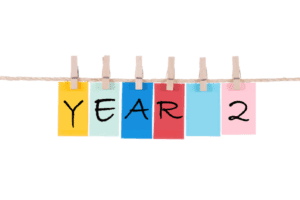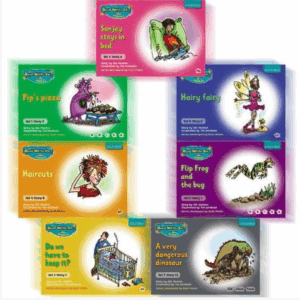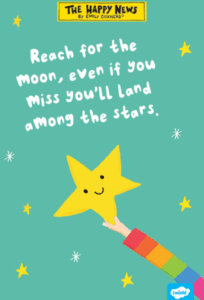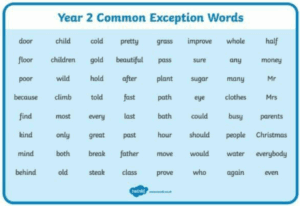Welcome to Year Two!
Happy New Year to you all! We hope you have a wonderful winter break. Our learning is going to be so exciting this term- inventions, learning about people that have achieved incredible things, traffic surveying and…carrying out a D&T project with Grace from Cbeebies. Eek- so exciting!
Below is some information that you may find useful. We will do our very best to update this page on a regular basis and here you will find useful website links, top tips and most importantly, dates for your diary! There is also a photo gallery so that you can see what we have been up to.

The Year Two Team
Year 2a – Miss Bradley
Year 2b – Mrs West
Teaching Assistants – Mrs Ford and Mrs Chisholm
1:1 Teaching Assistant – Mrs Beckett (2B), Mrs Richardson (2B)
Midday Supervisor – Mrs Cowlan
If you have any problems or questions, please do get in contact via ‘Class Dojo’. We are more than happy to help!
Useful Information
- PE Day – Tuesday
- Reading Diaries – Reading diaries should be in school every day. Please ensure that you, or your child, sign the reading record every time it is read. The children may not be able to change their book if their reading record is not signed.
- Book Changing – There are two reading schemes in our school. Read, Write Inc ‘Book Bag Books’ will be changed on Friday. Big Cat books will be changed on a Tuesday and a Friday. On both schemes, the children will read two school books each week. For information on your child’s reading scheme, please check their reading diary. Alternatively, information can be found below (‘Reading Diary Information’).
- Website Sections – Below are sections with more information regarding reading, assessment, and spellings. Please check these out by clicking the links.
Class Book:
George’s Marvellous Medicine by Roald Dahl
Tilly’s Time Machine by Ade Edmondson
Homework in Year Two
On a weekly basis, we expect the children to complete the following activities:
- Reading – Daily for 10 minutes
- Times Tables Rockstars – 20 minutes over the course of a week in the ‘Garage’ section.
- Knowledge Organiser – To learn the information given for the term and be able to answer questions from it.
- Spellings – Children who are accessing the RWI Spelling Programme will be expected to learn spellings at the beginning of each new unit. They will go home each Monday with a spelling quiz the following Monday.
- Common Exception Words – These will be sent out termly and bespoke according to what your child needs to practice.
If there are any other activities that are set, we will inform you through ‘Seesaw’ and ‘Class Dojo’.
The Year Two Curriculum
Click the link to discover all of the learning themes that the children will be taught across all subjects in Year Two.
Term Three
Invent and Achieve
This term, our English theme is based on inventions and achievements. We will find out how Lily built a snowman that didn’t melt and how Amelia Earhart soared to new heights.
Below are some of our other learning themes and key questions:
Maths: Multiplication and Division, 2D and 3D Shapes
History: Which was worse- the Great Plague or the Great Fire of London
Geography: How can a map show features of Sleaford?
D&T: Wheels and Axels
RE: How do Jewish people show that they are thankful?
Music: I Wanna Play in a Band (Rock Music)
PE: Gymnastics, Ball Skills
Computing: Pictograms
Useful Website Links:
Time Tables Rock Stars – Your child’s username and password is in their reading diary
Numbots – A fantasic resource to develop addition and subtraction facts. Your child’s username and password is in their reading diaries
Hit the Button – A great resource to speed up maths fluency
Maths Frame – Interactive Maths Games
Phonics Play – A super website to practice reading words
Little Bird Spelling – Need some extra practice to spell the Year 2 words? Try this game
Subject Information
Click the links below to find out more about some of the Year Two subjects.
We love reading in Year Two!
We want our children to love reading! We have chosen lots of exciting texts to hook them and stimulate their interest. These texts cover a range of genres including stories, non-fiction books and poetry. In the classroom, we will provide opportunities for the children to read for pleasure- the reading snug has already been a big hit!

The Reading Schemes
At St Botolph’s, we use the Collins ‘Big Cat’ reading scheme. We love this scheme as it helps to develop the children’s knowledge of common exception words and build on their phonics knowledge. In addition to this, the books cover a range of genres so there is something for every interest.
If your child is accessing the RWI Phonics Programme, they will be provided with a Storybook and a ‘Book Bag Book’ each week. The Storybook will have been read at least four times already whilst in school so, the children will be desperate to show off their fluency and expression! The ‘Book Bag Book’ will be based on the Storybook that has been read in school. It will contain many of the words and sounds that the children have been learning in school but, this book will not have been read by the children yet.
Did you know that reading for just ten minutes a day can have a huge impact on reading progress and will expose the children to new words, build their vocabulary and help to develop reading fluency, especially in terms of pace? If you need any support with reading at home or need some top tips when hearing your children read, there is some great information in the middle of the reading diaries. Alternatively, we are so happy to help so please ask a member of the team.
Does your child read lots of books from home as well as their school books? We’d love to know about them so please, feel free to record this in their diaries too!


Common exception words are important because they are just that- common. They are words that appear frequently in texts and that help readers understand what they are reading.
Below is a list of words that children should be able to read and spell by the end of Year Two. We will be working on these in school but extra practice at home makes a huge difference.
Do you know how to read and spell all of the Year Two words? If so, can you write them in interesting sentences?
In Year Two, the teachers are responsible for judging the standards the children are working at in English reading, writing, mathematics and science. To help inform these judgements, we will carry out assessments three times per year (autumn, spring and summer).

During the summer term, we have chosen to use the optional Standard Attainment Tests (SAT’S) for KS1. Attached below is an informative booklet, (produced by Standards & Testing Agency) that you may find helpful.
The tests are a tool for teachers to help measure the children’s performance and to identify their needs as they move into Key stage Two. The tests are also used to see how the children are performing against national expected standards.
Our children may not even know that they are doing formal assessments as we incorporate them into everyday classroom activities. The tests are carried out in a familiar setting with a familiar adult in a friendly way- stress free!
Below are the papers that will be carried out during the school year:
- English reading – short text and questions and long text and questions
- Mathematics – artithmatic and mathematical reasoning
- SPAG – Spelling, Punctuation and Grammar
Once the tests are complete, the teachers will use the results, along with work the children have done throughout the year, to help us to reach judgements about how the children are progressing at the end of Key Stage One. These judgements will be reported to you, the parents, in the end of year, summer reports.
Assessing Reading
Reading is assessed every term so, six times in the school year. We will inform you of your child’s reading progress by placing stickers in the reading diaries.
Term Five
Tales from Africa
In English (along with other subjects), our writing will be inspired by stories from Africa. We will use the non-fiction book, ‘The Most Important Animal of All’ to gather information and write explanation texts. Later this term, we will write pieces based on ‘Mama Panya’s Pancakes’.
Below are some of our other learning themes and key questions.
Maths: Money, Time
History: Great Discoveries – Howard Carter
Geography: A Village in Africa – Mugurameno
D&T: A Healthy Smoothie
RE: How do Muslim’s treat others?
Music: Hands and Feet (African Music)
PE: Dance, Athletics
Computing: Robot Programming
PSHE: Stereotypes
Dates for Your Diary:
29th April – Online Safety Workshop
8th May – VE Day Celebrations (come dressed in red, white and blue)
20th May – EYFS/KS1 Sports Day
23rd May – Wear Yellow for the Air Ambulance
23rd May – Last Day of Term
Term Three
Invent and Achieve
In English this term, we will learn to write instructions for ‘How to make a snowman that won’t melt’ and an information text all about Amelia Earhart. We will also be using our reading skills to learn about other inventors and amazing achievements.
Below are some of our other learning themes and key questions.
Maths: Division, Length, Money
History: Which was worse? The Great Plague or The Great Fire of London?
Geography: A Local Study: The River Slea
D&T: Wheels and Axels
RE: How do Jewish people show they are thankful?
Music: I Wanna Play in a Band (Rock Music)
PE: Gymnastics, Sending and Receiving
Computing: Pictograms
Dates for Your Diary:
5th February: Grace’s Amazing Machines D&T Project
12th February: Esafety and NSPCC workshop
14th February: Last day of term
Term Two
Once Upon a Time…
This term, our English theme is based on stories including Traditional Tales. Get ready for fire-breathing dragons, out of control porridge and magical spells!
Below are some of our other learning themes and key questions.
Maths: Multiplication and Division
History: How did Nicola De La Haye save England?
Geography: Continents and Oceans
D&T: Woodwork
RE: How do Christians show they are thankful?
Music: Nativity Songs
PE: Target Games, Fitness
Computing: Photography
Dates for Your Diary:
14th November – Trip to Lincoln Castle
15th November – Children in Need
23rd November – Christmas Jumper Swap
29th November – Red, Green and Gold Day
6th December – Christmas Fayre
10th and 11th December – KS1 Christmas Nativity
12th December – Christingle Service at 9am
20th December – Trip to the Pantomime
September
The pencils are sharp, the new books are labelled. Children, we are ready for you! Year Two is a very exciting year and we are so excited to work with you!
We hope you had a fantastic summer break and were able to have some lovely family time.
Term One
Shiver me timbers!
This term, our English theme is based on Pirates.
Below are some of our other learning themes and key questions.
Maths:
History: How did Nicola De La Haye save England?
Geography: Continents and Oceans
D&T: Textiles
RE: Why does Christmas matter to Christians?
Music: South African Styles
PE: Fundamentals, Team Building
Computing: IT Around Us
Dates for Your Diary:
1st October – Lincolnshire Day
8th and 9th October – Parents Evening
18th October – Last Day of Term
4th November – First Day of Term 2

